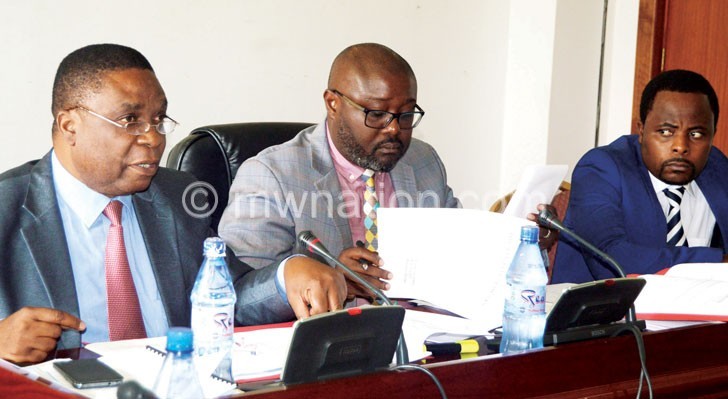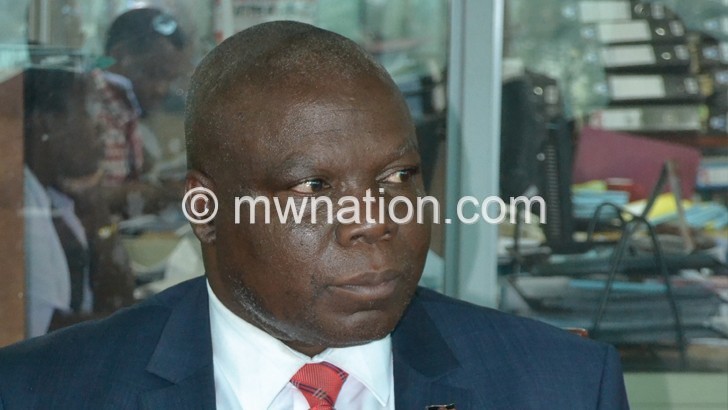ACB, PAC probe embassy fraud
The Anti-Corruption Bureau (ACB) and the Public Accounts Committee (PAC) are separately investigating suspicious financial dealings at Malawi’s Nairobi mission.
From documents we have seen, there are indications that the country lost billions of kwacha from 2005 to 2012 when the embassy was reopened in Kenya and through recruitment of property managers who allegedly received huge sums of money.

PAC, which a few days ago was in Kenya on a public inquiry to get down to the root of the looting, has so far described the Nairobi incident as a ‘cartel’.
PAC chairperson Alekeni Menyani said, in an interview, that so far the exercise has pointed to a number of issues.
“We are still in the process of our inquiry and do not intend to jeopardise our own progress through premature release of information. The exercise has pointed at a number of issues back home that we are successfully unearthing at the moment”.
Records we have seen indicate that following the closure of the mission in Nairobi in 2005, government opened a property account at Equatorial Commercial Bank (ECB) Kenya in November the same year, where funds for rented property; the Chancery and the Residence were deposited.
While a financial statement we have seen from ECB partly shows deposits to this account between 2005 and 2012, there is no indication of how much funds Malawi realised in the seven years the property was being rented out.
A report to government in 2013 by Malawi’s High Commissioner to Kenya Brigadier Marcel Chirwa indicates that there were massive withdrawals from the property account in 2012.

“It was after the change of signatories that the real transactions on the account were being conducted. Suffice to say before the new signatories were appointed on March 7 2012, the only withdrawals that could be recorded on the statement was ledger fee of $15 initially and later reduced to $10. Real and serious after the new signatories took over and they started using the account,” reads part of the report.withdrawals started in April 2012,
Bank records show that most transactions on the account were withdrawals that were done on a cash-cheque basis and a few were through bank transfers or cash deposits to the payee’ account. It is feared that in 2012, alone, funds amounting to over K300 million were withdrawn from the property account.
ACB senior public relations officer Egrita Ndala, in a response to a questionnaire, said they were investigating the matter after receiving a complaint.
“The Anti-Corruption Bureau recorded a complaint in September 2017, alleging that the Malawi Government Account with Equatorial Commercial Bank in Kenya was mismanaged from 2012 after change of signatories,” said Ndala in her response.
The massive withdrawals from the account in 2012, coincidentally, happened during the transition from the ruling Democratic Progressive Party (DPP) to Joyce Banda’s People’s Party (PP), following the sudden death of President Bingu wa Mutharika.

Then Foreign Affairs Principal Secretary Justin Saidi, who is now Secretary for Education, said he wrote a letter sanctioning the change of signatories because responsible officers had been posted to other ministries.
“My statement could be; the letter was written in order to change signatories following the posting away of the former director of administration. This is normal and what happened later does not nullify this statutory requirement,” he said.
Saidi could not respond to further questions, saying he has scanty memory of what happened since he left it some time back and he was at the ministry for less than two months.
Both the ACB and PAC investigations on the matter follow the Auditor General’s investigative audit, which was completed in March 2014.
The audit disclosed some weaknesses in financial controls and management of Malawi Government properties, namely the Official Residence and the Chancery.
According to principal auditor Rabson Kwagwamminga, who speaks for the National Audit Office (NAO), the investigative audit into the Nairobi property account was requested by the Ministry of Foreign Affairs and International Cooperation following intentions to reopen the mission.
“In December 2012, government announced plans to reopen it [the mission]. Consequently, the ministry sanctioned some rehabilitation works on the properties through which some public funds were expended. The Auditor General was engaged to assess the financial position of the mission before reopening the embassy,” said Kagwamminga.
The Auditor General’s report of 2014 points to suspicious appointment of property managers without following procedures.
“The Malawi Government engaged Sharpley Barret and Company as the mission’s lawyers when preparations to open the embassy in Narobi, Kenya started, that is, prior to 1991. However, a review of records and inquiries made at the ministry headquarters and at the embassy in Nairobi brought to light that for no apparent reason the Secretary for Foreign Affairs and International Cooperation appointed Lloyd Masika Ltd as the Property Managers, in November, 2005”.
The report adds that after taking over leadership, the PP-led government also terminated a contract with Masika and appointed their own property manager in May 2012, Messers Kairu Mbuthia and Kiingati Advocates, without following procurement procedures. The new managers received a monthly retainer fee of about $2 023.81 when the retainer fee for Lloyd Masika Limited was only $892.86 per month.
The report says Messers Kairu Mbuthia and Kiingati Advocates failed to enforce a contractual agreement with tenants who were required to rehabilitate the property at the end of their tenure in 2012 forcing government to pay even more.
“It was, however, observed that the tenant did not redecorate the house after expiry of the tenancy agreement in December, 2012. In this regard the cost of redecoration was to be borne by the mission instead of the then tenant which would result in the Mission incurring expenditures not planned for” reads the report.
While the ministry could not respond to our questionnaire sent three weeks ago, the Principal Secretary Isaac Munlo appearing before the Public Accounts Committee conceded that supervision of property in Kenya was compromised because “the ministry could not afford to send officers to Kenya to undertake frequent supervision”.
Meanwhile, the Attorney General’s office is looking at the report with an aim to take legal action against Messers Mbuthia and Kiingati Advocates, reclaiming about K360 million.





